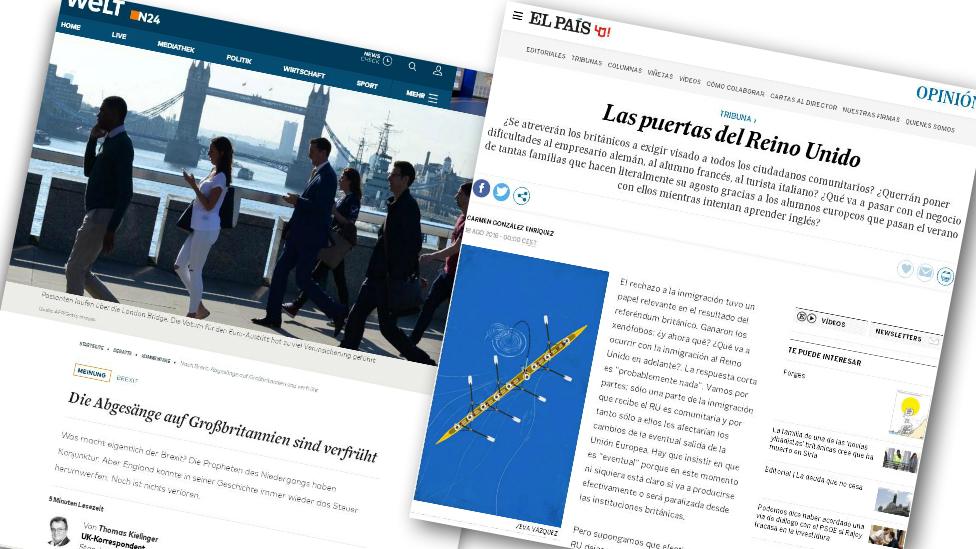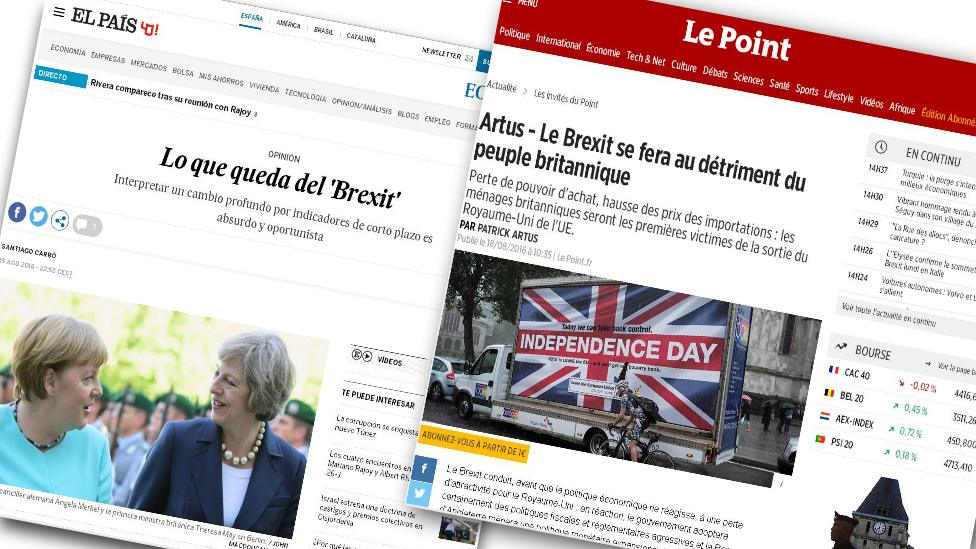Brexit: What the European papers say
- Published

"Songs of mourning for Britain are premature," says Die Welt, while El Pais examines "the gates of the UK"
European press commentators focus on the impact - economic and otherwise - Brexit is likely to have on Britain and the rest of the EU this week.
Look at the medals
The UK correspondent of Germany's Die Welt, external, Thomas Kielinger, believes the impact of Brexit on Britain may not be as negative as many "prophets of doom" on the Remain side fear, and argues that the country's history shows its ability to adapt and "turn the ship around".
"England is not yet lost," he insists, before adding: "You just need to look at the Olympic medal table."
Crumbs

El Pais looks at "what remains of Brexit", while Le Point says Brexit will "happen to the detriment of the British people"
In Spain's El Pais, external, migration researcher Carmen Gonzalez Enriquez believes the referendum victory of the "xenophobes" will in practice have little effect on immigration to Britain, arguing that non-EU migration will continue, and that Britain needs its EU migrants too much for its economy to give it a strong bargaining position in Brexit negotiations.
"Britain will end up having to settle for the crumbs that the EU offered before the referendum to appease the Eurosceptics," she predicts.
Too soon to tell
In El Pais's business pages, external, economist Santiago Carbo warns against jumping to conclusions - either positive or negative - about the economic impact of Brexit, arguing that doing so on the basis of short-term indicators is "absurd and opportunistic".
"Brexit will be the great economic, social and political experiment of the beginning of the 21st century, with implications for almost everyone reading these words," he adds.
Scant comfort
But in French news magazine Le Point, external, economist Patrick Artus is convinced that Brexit will be "to the detriment of the British people".
In the short term, he argues, the weaker pound will make British households "the first victims" of the UK's decision to leave the EU, while after Brexit, a likely loss of some access to the common market will hit investment, growth and employment - and all this amid further fiscal consolidation.
Time on UK's side
In Czech daily Pravo, commentator Michal Mocek warns his countrymen that Britain is delaying the start of negotiations to extract the maximum benefit for itself - to the disadvantage of the rest of the EU, including the Czech Republic
"Let us count with it that Britain will let nothing stand in its way - mainly not us, Czechs, Slovaks, Poles etc," he concludes. "The more time London gets, the worse it could be."
Why oh why
In Italy's La Stampa, external, international security expert Stefano Stefanini bemoans the fact that the debate about how to treat the departing British - with Germany and French potentially in opposite corners - will "absorb an EU already exhausted by crises and emergencies", and this at a time of numerous international challenges and threats.
"Why exactly do we have to have Brexit now?" he wonders. "Historians will find this difficult to explain to future generations of Europeans."
Axis of power
Joaquim Gay de Montella - the head of Catalonia's business federation - argues in Spain's La Vanguardia, external that, while Brexit may have delivered "powerful blow to the heart of the EU", now is the time to create a Europe that is "more united, stronger and fundamentally better prepared" to deal with its problems.
He adds that Spain must actively take part to defend the interests of its business community in Britain, and improve its presence "in the axis of power of influence of the new Europe".
BBC Monitoring reports and analyses news from TV, radio, web and print media around the world. You can follow BBC Monitoring on Twitter, external and Facebook, external.